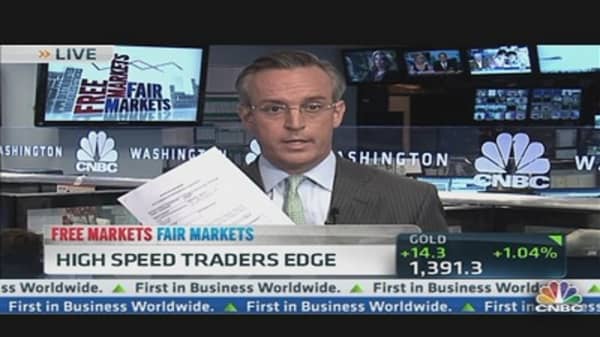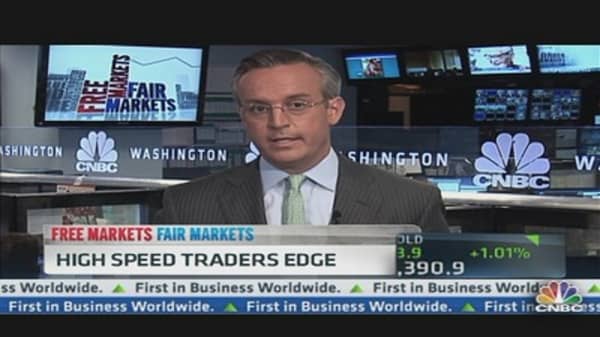Unlike the Michigan consumer confidence data, the ISM reports are not released to elite customers earlier than the general 10 a.m. distribution, but that doesn't mean banks aren't buying faster access.
According to the marketing material of Thomson Reuters, subscribers to its "News Direct Feed" can receive ultralow latency delivery of "key market-moving indicators, such as the Institute for Supply Management Reports On Business, Thomson Reuters/University of Michigan Surveys of Consumers and the Purchasing Managers' Index (PMI) data produced by Markit."
What's the advantage of ultralow latency? Thomson Reuters says it will enable customers to "be the first to react."
Think about it this way: If Thomson Reuters, which is the exclusive distributor for the ISM numbers, dropped the manufacturing report in the mailbox for some customers at 10 a.m. and emailed it to others at the same moment, it could claim it released the information to everyone at the same time. But some would get it moments later, while others would wait for days. Obviously, getting it by email would convey a big advantage.
The times involved in ultralow latency releases are much smaller—fractions of a second. But with high-speed trading, passing and momentary advantages are very valuable.
How valuable? Well, if firms agree to shell out for early access or delivery, it's clear that Wall Street, at least, believes that getting information early or faster is very valuable.
And Thomson Reuters isn't the only one providing faster access to those willing to pay hefty fees. Rival Bloomberg and the exchanges themselves sell low-latency access.
A variety of regulatory rules prevent some kinds of market moving information from being selectively disclosed. Public companies are required under Reg FD to avoid releasing material information except through approved channels intended to ensure equal access. Brokerages are required to prevent research departments from providing information about upcoming reports until they have been released to clients.
The differential release or delivery of economic reports seems to violate at least the spirit of rules aimed at creating a level playing field for traders and investors, even though it appears to be perfectly legal under current regulations.
There is a family resemblance between this practice and the "trading huddles" in which Goldman Sachs' research analysts met to develop tips that were passed on to its traders and most-favored clients.
Goldman paid tens of millions of dollars in fines to the Security and Exchange Commission and to Massachusetts regulators over the huddles, and had to change the way it operates. And in an unusual move, the firm actually admitted to certain facts in the regulatory complaints rather than employ the "neither admit nor deny" language usually found in Wall Street settlements with regulators.
Similarly, regulators have tried to crack down on the data race that drove the "expert network" business. Hedge funds paid large fees to expert networks in an effort to get better information about companies and markets—until the SEC and the Justice Department cracked down on the business.
The main difference is that when it came to the huddles and expert networks, regulators had clearer rules on which they could pin their allegations. The SEC said the huddles were inadequately supervised and created the risk that analysts would tip customers off to things like ratings changes before reports were published. Some of the expert networks became transmission mechanisms for nonpublic material information that led to insider trading, law enforcement experts claimed.






